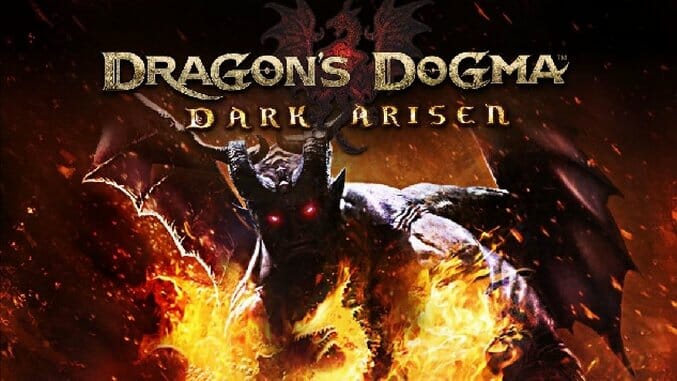
Capcom’s Dragon’s Dogma is the Japanese company’s take on that good old sort-of-western-Europe-in-the-Middle-Ages location, a kaleidoscope of greens and grays and browns, more mud than anime in its aesthetic. Here are ten reasons why I really liked it.
1. Twice the Character Creation
If you’re like me (you’re probably not), videogame character creation is an exercise in making someone who looks as much like you as the system allows. After you’ve done that with your character, Dragon’s Dogma presents you with a second character creation screen for your Pawn. Make it look like your BFF, or your SO, or your #WCW, or your Favorite Celebrity, or whatever.
2. Those Aforementioned Pawns
The rest of your party is made up of up to three of these AI-controlled characters. You recruit them from around the game world or in a special area known as The Rift. One of the game’s currencies, riftstones, can be used to recruit pawns of a higher level than your character. Pawns at or below your level, or those that come from players on your friends’ list, can be recruited for free, regardless of their level. Pawns function as an in-game hint system—if your pawn has been recruited by another player (more on that later), or you recruit pawns who have been used in another game on your current quest or fighting an enemy you’re currently, they can provide hints on where to go or what to do or how to kill it.
3. Network Effects
The cosmology of Dragon’s Dogma is built on its network structure. An infinite number of parallel worlds are connected by the Rift. Each of these worlds has its own Arisen (your player character), who is very important in that world but unable to get to the others. It’s the Pawns, these weird in-between creatures that look human but aren’t, that can travel between them. Any Pawn used in another game will come back with knowledge and maybe an item or two. This particular online feature has made a return in Xenoblade Chronicles’s BLADE Scouting.
4. Your Pawns Can Make You Useless…
The ability to recruit your friends list’s Pawns for free no matter their level can make for a dynamic unlike most other RPGs. If, for example, you’ve just started the game but your friend Gus has finished it, you can recruit his Pawn to your party and suddenly all of the lower-level-enemies you encounter are dying in a hail of high-level magic spells that your own mage Pawn won’t be able to cast for at least another twenty hours of the game.
5. But Not Really Useless
While you can fill your party with Pawns so much stronger than you, they don’t always know the best tactics for fighting the larger enemies. For example: you’ll eventually find yourself fighting a cyclops with a helmet-mask protecting its eye. Rather than have you hammer that mask with attacks until it breaks, as so many games would, its removal is a matter of climbing up the front of the cyclops and onto the top of its head. When it swings at you, the upward sweep of its arm catches the mask, knocking it to the ground.
6. And Still More Teamwork
Is a flying enemy avoiding the strong melee attacks of your party? The springboard/launchboard skill allows you to throw a Pawn or be thrown yourself into the air. Grab onto the dragon or the griffin or whatever and wail away.
7. Megafauna
Though nothing in the game ever reaches Shadow of the Colossus’s scale or climbing complexity, there are plenty of things for you to grab onto. Crawl over a chimera, attacking each of its heads in order to stop a certain power, or crawl along the belly of a dragon to reach its weak underbelly.
8. It’s All Your Favorite Games in One
I just mentioned Shadow of the Colossus, but here are some other games/genres you may be reminded of when playing: survival horror, rooftop running a la Assassin’s Creed, the borderline-nonsense romances of Bioware (here, though, you don’t even realize you’re wooing someone until you’re asked to sacrifice them near the end). What Dragon’s Dogma has in pastiche it makes up for in lack of polish. That’s not a criticism.
9. Geography
The first few story missions of the game are fairly expected: a giant dragon steals your heart in an attack on a seaside village, after which you set off on your quest. Your first stop is a fort north of the village. After defending it from a hydra, you travel with a caravan delivering one of its heads to the duke in the capital city of Gran Soren. And that’s really it for the quest hub cities: instead of traipsing from place to place, opening up more of a map as you go, it takes a hub-and-spoke approach. You’ll start in Gran Soren, head off to the place where you do what you do, and then return. Before the expansion Dark Arisen was released, fast travel around the land of Gransys was limited: you use an inventory item called a ferrystone to travel instantly to any portcrystal you’ve visited. There just aren’t a whole lot of portcrystals in the game. There is one in Gran Soren, though, so you don’t always have to walk back.
10. When Things Go Bad, It’s Probably Your Fault
Dragon’s Dogma is a noir. It’s a sick world, though the reason why isn’t clear until near the end. It has a fatalist sensibility that explodes after your quest is complete. It’s the kind of thing that might get under the skin of someone who expects the time they put into a game rewarded with a world that becomes steadily improved with the time they spend in it. If things are made worse, it’s more often because of a deviation from the quest. Eventually things work out, though it might not be for whom you expect.
Brian Taylor is on Twitter.